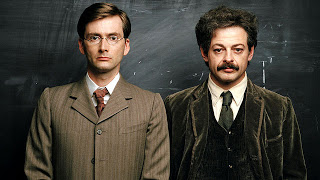
I don’t know enough about the two figures to judge how historically accurate it was. I’d be somewhat surprised if the two scientists were quite so quick to grab handy everyday objects, such as table cloths, hard boiled eggs and socks, to throw them around in television-friendly demonstrations of the basic principles of general relativity, in a period drama version of “How 2”.
But as a drama, it was excellent. It skilfully shows the interaction between these two scientists’ scientific ideas, their personal lives, their religious beliefs, and their historical moment of the First World War. We see the impact that Einstein’s studies have on him personally. He pays a heavy price in his family life and in the relationships with the women he loves
But of the two characters, I found Eddington’s story by far the more involving. Eddington struggles between Newtonian orthodoxy and Einstein’s bold new ideas, between his pacifism and his patriotism in the face of the First World War, struggling with his love for his friend William Marston which he dare not express, and between his faith and the horrors of war. The script, and David Tennant’s performance, weave all these conflicts together, all of them impacting on each other, to powerful effect.
In the Doctor Who story Human Nature, the Doctor became an emotionally tortured Edwardian gentleman, and the casting director of this production was obviously playing attention, since as Eddington, David Tennant has the very similar role of an emotionally tortured Edwardian gentleman.
When Eddington is bleeding from a punch in the face for helping a German family, it’s oddly more shocking because Tennant is the Doctor, and that kind of realistic physical violence is not something the Doctor has to face at Saturday teatimes. But this is just one obvious example of how the role of Eddington allows Tennant to explore different and richer territory than that typically offered by the role of the last of the Time Lords.
Central to Eddington’s character is his faith. As a Quaker, he was a conscientious objector, and even at a time when the death of his friend is causing him to deeply question his faith, he is a man of enormous principle, speaking out passionately against a motion to cut off communication with German scientists.
The story explores the relationship between science and faith. Towards the start, Eddington presents Newton’s theory of gravity as part of a Christian view of the world full of confidence that “everything happens for a purpose”. But his confidence is shaken both by Einstein’s new theory that time is not absolute but relative, and by the death of Marston in the War.
When Jim Broadbent’s character argues that Newton’s theory will stand, Eddington first answers “Mercury”, whose orbit does not fit the Newtonian scheme. Broadbent insists that Newton will one day be able to explain the irregularities in Mercury’s orbit, just as the discovery of Neptune made sense of Uranus’ orbit – everything does indeed have a purpose. Eddington’s second answer is of a different order: “Ypres”.
Einstein’s view on God is also shown. He cannot conceive of a God who “wills” in the sense that we will, or of the possibility of someone outlasting their own physical end in some kind of afterlife. But Eddington’s story is not ultimately one of moving from a Newtonian Christian certainty to a Einsteinian atheistic relativism. His faith is shaken, but as he finds the evidence to support Einstein’s theories, he affirms that in this new understanding, he can hear the mind of God. His faith is shorn of the confidence of modernism, but is able to re-emerge with a new humility.
Whether I’d hold the same opinion of it after looking at what actually happened, I don’t know, but possible historical license and some slightly shaky science explanations aside, this was a very good piece of television.

